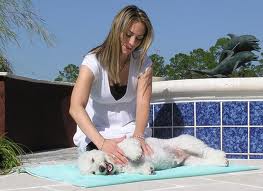 The fact that humans benefit from massage is well documented: increased circulation, improved digestion, strengthened immunity, stress relief and muscle relaxation to name a few. So do pets get the same medical benefits as their owners? Many Veterinarians feel the evidence is flimsy but this could be due to the fact that there is so little research having been done to draw any real conclusions.
The fact that humans benefit from massage is well documented: increased circulation, improved digestion, strengthened immunity, stress relief and muscle relaxation to name a few. So do pets get the same medical benefits as their owners? Many Veterinarians feel the evidence is flimsy but this could be due to the fact that there is so little research having been done to draw any real conclusions.
“People realize more and more that what’s good for me, including massage, is probably good for my animal,” said Jean-Pierre Hourdebaigt, an animal massage therapist and teacher in Wellington, Fla., whose book Canine Massage: A Complete Reference Manual is considered the standard text.
Regardless of what some might think, workshops specializing in pet message at pet stores, animal hospitals, dog daycare centers and massage schools have increased substantially in recent years. The American Animal Hospital Association in Lakewood, Colorado conducted survey of more than 1,200 pet owners in Canada and the United States and found that the number of pet owners seeking alternative therapies for their animals rose 21 percent from 6 percent from 1996 to 2003 and may still be rising today.
Pet massage owes its heritage to equine massage which took off 1970s and 80’s by Jack Meagher, a massage therapist for the U.S. equestrian team. In the 1990s many who were experienced in equine and human massage began to adapt these techniques to pets.
Plenty of veterinarians note that few clinical studies of pet massage have been conducted and that the benefits to pets have been in large part extrapolated from human data. However, they do claim that one of the major benefits would be the fortification of the bond between owners and their pets.
“I have two dogs, and I pet them all the time,” said David W. Ramey, a veterinarian in the Chatsworth area of Los Angeles, and a co-author of Complementary and Alternative Veterinary Medicine Considered, a book that looks at the science behind various alternative therapies for pets. “I think everybody should pet their dogs. But I don’t refer to that as ‘massage,’ and I certainly wouldn’t send anyone to a glorified school of dog petting.”
Narda Robinson, a veterinarian at Colorado State University in Fort Collins, believes there are real and substantial benefits to pet massage. Robinson established a canine medical massage course at the university in 2008 and believes that “massage, properly administered, can help dogs recover from illness, injuries and stress. And while massage classes for dog owners are largely unregulated and of varying quality,” she said, “they can be helpful as long as they are based on actual science, rather than lost in mysterious energies.”





